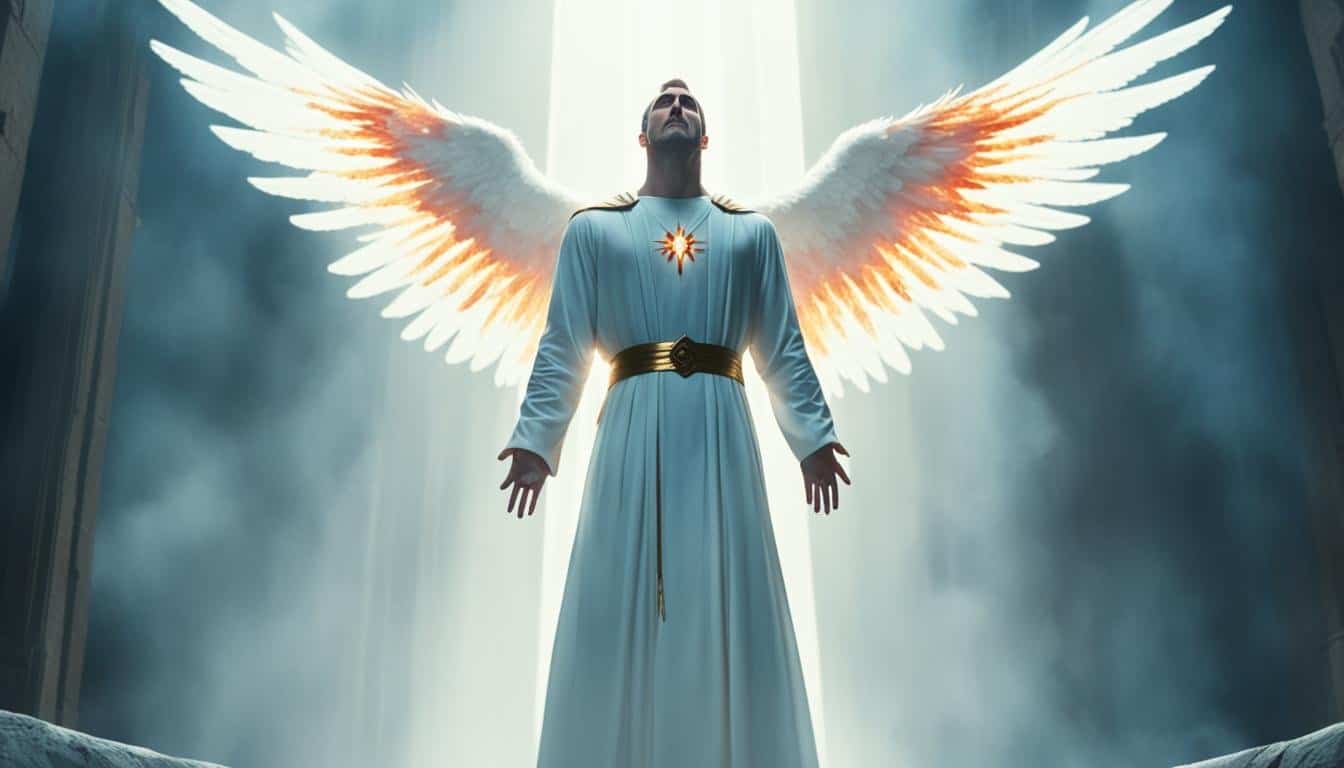The book of Genesis tells captivating stories about encounters with celestial beings. These stories are from the Garden of Eden to Jacob’s ladder. They give us deep insights into God’s nature and our role in life.
Have you ever imagined what it’s like to meet a celestial being face to face? What does it feel like to be near God? Let’s dive into these fascinating stories from Genesis. We’ll discover the messages they hold about our relationship with the divine.
Key Takeaways:
- Genesis presents vivid depictions of celestial beings and divine encounters.
- The Garden of Eden portrays a perfect paradise in divine proximity.
- The serpent’s encounter with Eve reveals the deceptive nature of celestial beings.
- God’s awareness of human actions is showcased through the encounter with Cain and Abel.
- The Tower of Babel illustrates God’s power and control over human ambition.
Let’s start exploring the world of divine encounters in the book of Genesis. A journey full of intrigue awaits!
The Garden of Eden: A Paradise in Divine Proximity
Genesis tells an amazing story. It is about the Garden of Eden, a place of beauty and harmony. God often visited humanity here. The garden was a mixture of earth and heaven, showing a clear connection between the two.
Picture a sanctuary full of plants and animals, all created by God. In this garden, you’d hear the world come alive in a dance. Life’s essence and the Creator were so palpable there. It was the perfect paradise, bright with divine light.
Just as the tree of life stood tall in the heart of the garden, so too did the grandeur of God’s love encircle humanity in an intimate embrace. The intertwined branches of heaven and earth found their purest expression in this place of unparalleled beauty.
Walking through the garden, one can feel the unique bond between God and man. It clearly shows how humans and God are closely tied. This place shows how we all want to be near God and experience His presence.
The story of the garden in scripture reminds us of our desire to connect with God. It encourages us to look for a perfect paradise. In this paradise, God is not far away but right here with us.
Imagine being in this beautiful garden, hearing nature’s song. Smell the freshness of the air. It fills you with wonder. Each step connects you to the heavens and the earth.
This picture captures the garden’s unmatched beauty. It was a place full of life and God’s spirit. It sums up what a perfect paradise is. Let it remind us we too seek to be close to God.
Key Insights:
- The Garden of Eden is a symbol of a perfect place where God is near.
- God’s presence in the garden shows a close relationship with humans.
- The garden reflects our deep desire to be near God.
- It gives a vision of living in perfect harmony with God.
Comparing Aspects of the Garden of Eden
| Aspects | Description |
|---|---|
| Garden’s Beauty | A place of unspoiled natural splendor, teeming with vibrant flora and fauna. |
| Divine Proximity | God walks among humanity in the cool of the day, fostering a close bond. |
| Intimacy with the Divine | Humans experience the harmonious presence of God and the divine realm. |
| Tree of Life | A symbol of eternal life, representing the connection between humanity and God. |
The Fall of Man: Deception by a Celestial Being
In Genesis, we learn about the fall of man in the Garden of Eden. A clever serpent tricks Eve and Adam. This action leads to the moment when sin comes into the world.
The serpent, speaking to Eve, shows his deceptive side. He uses Eve’s curiosity to make her eat from the forbidden tree. This is the start of humanity’s separation from God.
And the serpent said unto the woman, “Ye shall not surely die: for God doth know that in the day ye eat thereof, then your eyes shall be opened, and ye shall be as gods, knowing good and evil.” – Genesis 3:4-5
This story teaches us to be careful. It warns us about how we can easily be led astray. We must be smart and strong against temptations and deceit.
The fall of man is a sad but important story in human history. It shows the deep questions about evil, free will, and how easily we can be tricked. It’s a story that keeps us thinking.

The Influence of Celestial Beings on Human Choices
| Celestial Beings | Influence | Impact on Humans |
|---|---|---|
| The Serpent | Deception and Manipulation | Introduces sin and separates humanity from God. |
| Angels and Messengers | Divine Guidance | Deliver messages, warnings, and instructions from God. |
This table shows how different celestial beings interact with us. The serpent is tricky, while angels bring God’s messages. It reminds us to be wise in knowing who is trying to help us from those trying to harm us.
Cain and Abel: Divine Awareness of Human Actions
After Cain killed his brother Abel, God talks to Cain. God asked him, “Where is Abel, your brother?” This question shows that God knows everything about us. It means we all face divine judgment for our actions.
God’s talk with Cain shows us that our actions are always seen. It reminds us we’re accountable for what we do. Knowing this can help us make better choices.
“Where is your brother Abel?”
God’s question makes Cain think about what he did. It’s a moment where Cain needs to face what he’s done wrong.
This encounter is just one example. God’s awareness of what we do is throughout the Bible. It shows how God’s all-powerful and all-knowing. Our choices matter a lot in God’s plan.
The Consequences of Our Choices
Cain and Abel’s story tells us about choice and its effects. It warns us about the impact of our choices. They can be good or bad and affect many things.
Looking at Cain’s story, we learn how important it is to do what’s right. It tells us that our choices have deep moral meaning. We must be good not just for us but also for God.
In the end, God’s talk with Cain teaches us about right and wrong. We are reminded our choices shape who we are. It tells us to aim for goodness and growth in our faith. Everything we do matters, not just for us but for the world we live in.
| Key Points | Benefits |
|---|---|
| The divine encounter between God and Cain highlights divine awareness of human actions. | Offers guidance and moral compass |
| God’s question challenges Cain to reflect upon his actions and accept responsibility. | Promotes personal reflection and accountability |
| The story emphasizes the consequences of our choices and the importance of pursuing righteousness. | Fosters moral growth and development |
The Tower of Babel: God’s Power and Control
The story of the Tower of Babel in Genesis is a powerful one. It shows God’s ultimate rule over human ambition. People wanted to build a tower that reached the sky. They thought this would make them great. But God stopped them by confusing their language.
This tower was more than just a building. It was a symbol of humans wanting to be like God. However, God showed them that true power lies only with Him. In the end, human plans without God’s direction fail.
When God scattered the people and mixed up their words, it sent a clear message. If our goals are selfish and ignore God, they won’t succeed. This story warns us about pride. It teaches us to be humble and to follow God’s plan, not our own.
Abraham’s Covenant: A Pivotal Divine Encounter
God appears to Abraham in a vision. He promises a vast land and many descendants. This encounter defines Israel’s future. It also marks a key covenant between God and His chosen people.
Abraham’s covenant is vital in the Bible. It shows God’s deep commitment to humanity. It is proof of God’s desire for a special relationship with his people.
Abraham’s role in this covenant is crucial. He and his descendants begin a special journey. This journey is filled with blessings and purpose from God for many generations.
The covenant’s promises give Abraham hope. They are the foundation of faith for the Jewish people. They believe they are the inheritors of God’s plan.
Abraham’s experience shows God’s closeness to us. He provides guidance, protection, and blessings. It reveals God is actively involved in our lives.
This encounter teaches about faith and obedience too. Abraham’s trust in God ensures the covenant’s fulfillment in future generations.
Reflecting on Abraham’s covenant reminds us of God’s lasting commitment to His people. It inspires us to seek similar encounters with God. We learn to trust His promises and understand our part in His plan.

Jacob’s Ladder: A Transformative Encounter
Jacob is running from his brother Esau when he dreams of a ladder to heaven with angels. In this dream, God promises Jacob His protection and blessings. The ladder dream shows how God is always with us, even in uncertain times.
This moment is crucial for Jacob, who’s fleeing and worried about his future. Despite his fear, God shows Jacob a vision to prove He’s watching over him. This vision renews Jacob’s faith and trust in God.
“And Jacob dreamed, and behold, there was a ladder set up on the earth, and the top of it reached to heaven. And behold, the angels of God were ascending and descending on it.” – Genesis 28:12
The ladder from Jacob’s dream is more than just a symbol. It shows the connection between God in heaven and us on earth. This dream comforts us by showing that God is always reachable, no matter our struggles.
Seeing angels go up and down the ladder brings Jacob peace. He understands that God sends help whenever it’s needed. This strengthens Jacob’s belief in God and his understanding of divine encounters.
Jacob’s encounter with the divine changes him deeply. It helps him grow spiritually and become a leader in God’s plan. Through this experience, Jacob learns to rely on God, shaping his future.
Just like Jacob, we can also meet God in transformative ways. These encounters may be through dreams, deep thoughts, or other surprising moments. They have the power to transform our faith and lead us on a spiritual journey.
The story of Jacob’s ladder tells us about God’s constant presence and power to transform. It reminds us that we, too, can meet God in ways that change us. This encourages us, offering hope and deepening our connection to God’s plans.

Hagar and the Angel: Divine Care and Instruction
In the desert, Hagar was in a tough spot. Pregnant and on her own, she’d left her master Sarai. Yet, she met an angel sent by God in her darkest hour.
This angel brought Hagar a message of hope and provision from God. The angel spoke kindly about Hagar’s son, Ishmael, who would lead a great nation.
The angel told her, “God heard your cries. Go back to your mistress, and your descendants will be countless.”
This meeting with the angel lifted Hagar’s spirits. It showed her God remembered and cared for her and her son.
Hagar’s story with the angel highlights God’s love in hard times. It’s a powerful view of divine care beyond human standards. God’s compassion is available to all who reach out to Him.
Like Hagar, we can find comfort in God’s care and guidance. Despite our troubles, God is always looking out for us, ready to lead us.

Sodom and Gomorrah: Angels as Messengers
In the story of Sodom and Gomorrah, we see how God’s judgment unfolds. Angels played a key role as messengers. They warned Lot, who was Abraham’s nephew, about the coming destruction of the cities (Genesis 19).
When the angels arrived in Sodom, everyone noticed them. They stood out because of their heavenly nature. Lot welcomed them into his home. But the people of Sodom, who were very wicked, wanted to harm the angels.
“And they said, ‘Stand back!’ Then they said, ‘This one came in to stay here, and he keeps acting as a judge; now we will deal worse with you than with them.’ So they pressed hard against the man Lot, and came near to break down the door” (Genesis 19:9).
The angels stopped the angry mob by making them blind. This act protected Lot. The angels then warned Lot and his family to leave the cities before they were destroyed.
“Then the men said to Lot, ‘Have you anyone else here? Son-in-law, your sons, your daughters, and whomever you have in the city—take them out of this place! For we will destroy this place, because the outcry against them has grown great before the face of the Lord, and the Lord has sent us to destroy it'” (Genesis 19:12-13).
The angels were clear in their message. They were bringing God’s severe judgment on the evil in Sodom and Gomorrah. They were heaven’s messengers, warning of punishment.
The Binding of Isaac: Divine Intervention
In the story of the binding of Isaac, we see a powerful example of divine intervention. God tells Abraham to sacrifice his son to test his loyalty. Abraham gets ready to follow through, showing his deep faith. But, just before he acts, an angel appears. This angel stops Abraham, showing God’s understanding and kindness by stepping in at the last moment.
This amazing interaction tells us about God’s role in our lives. In our hardest times, when we have to make impossible choices, God can change our path. The binding of Isaac story highlights God’s love. It also shows the great lengths God will go for our good.
From this tale, we learn that divine help isn’t just in old stories. It’s still around today. When we struggle or have to give up something important, Abraham’s story can give us hope. We can trust that God is with us and will act when needed. The binding of Isaac teaches us about the never-ending help and direction we get from God in our life’s journey.
Affiliate Disclosure: "As an Amazon Associate I earn from qualifying purchases made from links in this post. We are a participant in the Amazon Services LLC Associates Program, an affiliate advertising program designed to provide a means for us to earn fees by linking to Amazon.com."

